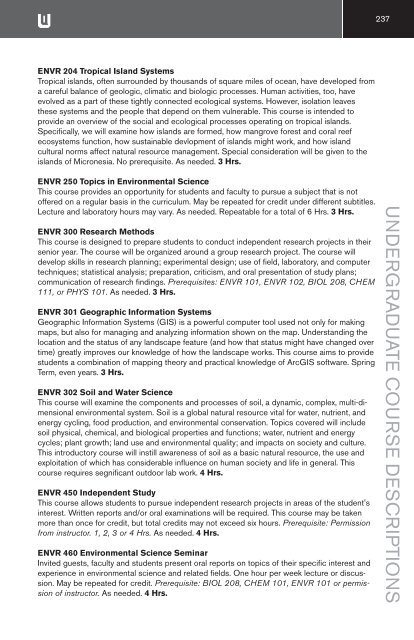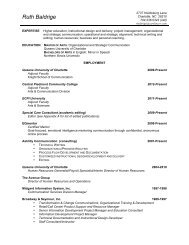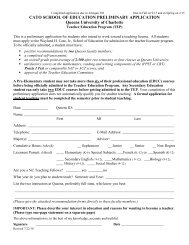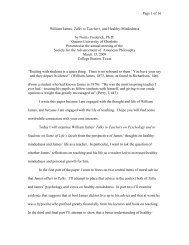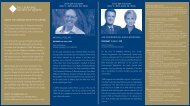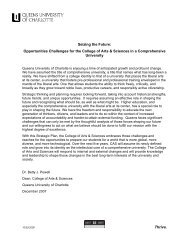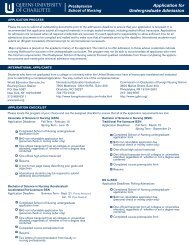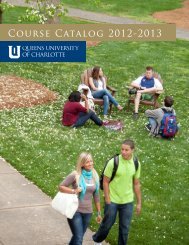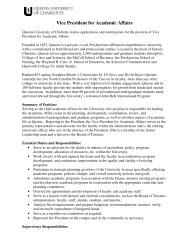2008-2009 Academic Catalog - Queens University of Charlotte
2008-2009 Academic Catalog - Queens University of Charlotte
2008-2009 Academic Catalog - Queens University of Charlotte
You also want an ePaper? Increase the reach of your titles
YUMPU automatically turns print PDFs into web optimized ePapers that Google loves.
237<br />
ENVR 204 Tropical Island Systems<br />
Tropical islands, <strong>of</strong>ten surrounded by thousands <strong>of</strong> square miles <strong>of</strong> ocean, have developed from<br />
a careful balance <strong>of</strong> geologic, climatic and biologic processes. Human activities, too, have<br />
evolved as a part <strong>of</strong> these tightly connected ecological systems. However, isolation leaves<br />
these systems and the people that depend on them vulnerable. This course is intended to<br />
provide an overview <strong>of</strong> the social and ecological processes operating on tropical islands.<br />
Specifically, we will examine how islands are formed, how mangrove forest and coral reef<br />
ecosystems function, how sustainable devlopment <strong>of</strong> islands might work, and how island<br />
cultural norms affect natural resource management. Special consideration will be given to the<br />
islands <strong>of</strong> Micronesia. No prerequisite. As needed. 3 Hrs.<br />
ENVR 250 Topics in Environmental Science<br />
This course provides an opportunity for students and faculty to pursue a subject that is not<br />
<strong>of</strong>fered on a regular basis in the curriculum. May be repeated for credit under different subtitles.<br />
Lecture and laboratory hours may vary. As needed. Repeatable for a total <strong>of</strong> 6 Hrs. 3 Hrs.<br />
ENVR 300 Research Methods<br />
This course is designed to prepare students to conduct independent research projects in their<br />
senior year. The course will be organized around a group research project. The course will<br />
develop skills in research planning; experimental design; use <strong>of</strong> field, laboratory, and computer<br />
techniques; statistical analysis; preparation, criticism, and oral presentation <strong>of</strong> study plans;<br />
communication <strong>of</strong> research findings. Prerequisites: ENVR 101, ENVR 102, BIOL 208, CHEM<br />
111, or PHYS 101. As needed. 3 Hrs.<br />
ENVR 301 Geographic Information Systems<br />
Geographic Information Systems (GIS) is a powerful computer tool used not only for making<br />
maps, but also for managing and analyzing information shown on the map. Understanding the<br />
location and the status <strong>of</strong> any landscape feature (and how that status might have changed over<br />
time) greatly improves our knowledge <strong>of</strong> how the landscape works. This course aims to provide<br />
students a combination <strong>of</strong> mapping theory and practical knowledge <strong>of</strong> ArcGIS s<strong>of</strong>tware. Spring<br />
Term, even years. 3 Hrs.<br />
ENVR 302 Soil and Water Science<br />
This course will examine the components and processes <strong>of</strong> soil, a dynamic, complex, multi-dimensional<br />
environmental system. Soil is a global natural resource vital for water, nutrient, and<br />
energy cycling, food production, and environmental conservation. Topics covered will include<br />
soil physical, chemical, and biological properties and functions; water, nutrient and energy<br />
cycles; plant growth; land use and environmental quality; and impacts on society and culture.<br />
This introductory course will instill awareness <strong>of</strong> soil as a basic natural resource, the use and<br />
exploitation <strong>of</strong> which has considerable influence on human society and life in general. This<br />
course requires segnificant outdoor lab work. 4 Hrs.<br />
ENVR 450 Independent Study<br />
This course allows students to pursue independent research projects in areas <strong>of</strong> the student's<br />
interest. Written reports and/or oral examinations will be required. This course may be taken<br />
more than once for credit, but total credits may not exceed six hours. Prerequisite: Permission<br />
from instructor. 1, 2, 3 or 4 Hrs. As needed. 4 Hrs.<br />
ENVR 460 Environmental Science Seminar<br />
Invited guests, faculty and students present oral reports on topics <strong>of</strong> their specific interest and<br />
experience in environmental science and related fields. One hour per week lecture or discussion.<br />
May be repeated for credit. Prerequisite: BIOL 208, CHEM 101, ENVR 101 or permission<br />
<strong>of</strong> instructor. As needed. 4 Hrs.<br />
UNDERGRADUATE COURSE DESCRIPTIONS


